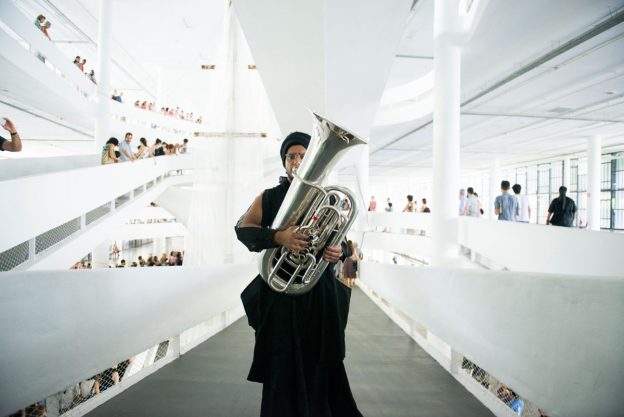Dorothy Max Prior chronicles the year that turned out to be – well, different to expected. Part one takes us from January to June 2020
Early March 2020. The man sitting next to me on the overnight flight from São Paulo to London Heathrow is wearing a mask. Bit excessive, I think. Must be something to do with that new flu thing.
You’ll have to forgive me – I’d been in Brazil since the end of January, and the news there is mostly limited to what’s happening in Brazil. It’s an enormous country and very little of anything beyond its borders, with just a nod to the rest of the Americas, makes it into the newspapers or onto the news broadcasts. I’d tuned into BBC Sounds a few times and accidentally caught a news bulletin that had mentioned rising cases of this new coronavirus, Covid-19, in Italy. And Facebook friends living in China had posted about being quarantined, unable to go out other than to buy food or medicines. That’s a bit harsh, I think. Good job we don’t live in China!
So I landed in London in a state of ignorance.
Five weeks earlier, I’d left the UK on the day we’d left the EU – 31 January 2020. In fact, at 11.59 I’d glanced at the flight map and noted that the plane was just leaving the western-most tip of Portugal – we were literally leaving Europe. Hey ho! I felt glad to be escaping Britain, and what would no doubt be the news story that would dominate early 2020.
Backtrack to the weeks before that, and 2020 had started the way it often does, with a Xmas and New Year run of the latest show by multi-media company 1927, at The Old Market venue in Hove – this time, it’s Roots, which premiered the previous summer at the Edinburgh International Festival 2019. What a pleasure to see this show again – a return to the company’s ‘poetic sketch’ format, with a number of reworked folk tales (all with a nasty twist) animated beautifully by Paul Barrett, with spoken word soundtracks that included the voice of not only company founder/director Suzanne Andrade but also brilliant guests such as Kazuko Hohki of Frank Chickens fame. The live performer–musicians take composer Lilian Henley’s music into new adventures, using a fabulous array of unusual instruments. Well, that’s a good way to start the year – a year no doubt due to be filled with all sorts of fabulous live theatre.
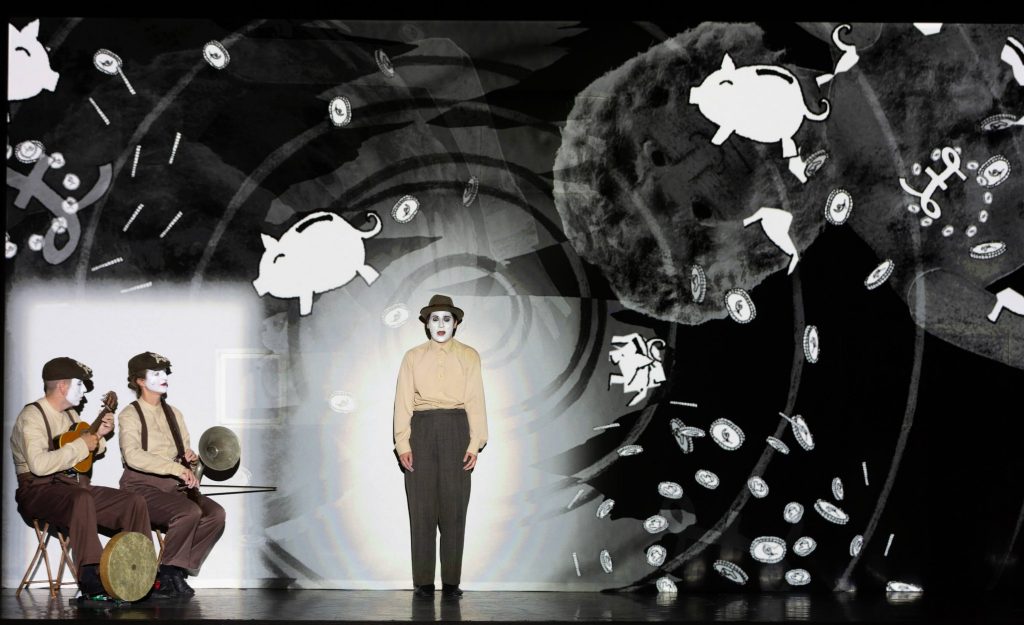
January continued, as it always did, with the month-long London International Mime Festival 2020. Some of the highlights included an intergenerational circus-theatre show about family relationships, This Time from Ockham’s Razor; a multi-media exploration of a fantasy love-affair with a kangaroo man, ROOMAN by Fleur Elis Noble; a show in which a musician and a puppeteer dance with death, La Pendue’s Tria Fata; a pair of clowns trapped in a cardboard world, Coulrophobia by Opposable Thumb, Dik Downey’s new company; and a darkly disturbing dance-theatre exploration of childhood, Peeping Tom’s Child, the third in their ‘family’ trilogy. And these are just a few of the fabulous shows that were presented. As always, I felt enormous gratitude to have such a marvellous programme of top-notch international physical and visual performance brought to us by LIMF. My theatre belly felt so full, I could almost live off of it all year.
And the feast continued in Brazil.
In São Paulo city, the 34th biennale was about to launch, with a year-long exhibition, installation and performance season called Faz escuro, mas eu canto (Though it’s Dark, Still I Sing), the title taken from a line of verse by the Amazonian poet Thiago de Mello. The curatorial starting point was a desire to bring together a large number of artists to explore the notion of finding light in the darkness of oppression and confinement. The original intention was a focus on colonialism and the legacy of slavery – but as time went by throughout 2020, it took on other meanings informed by both the pandemic and the Black Lives Matter protests. The opening event, on 8 February 2020, gave us South African sound artist Neo Muyanga’s A Maze in Grace, the enormous space of the Fundação Bienal gallery taken over by a chorus of forty Afro-Brazilian artists and musicians who processed through the space and through the crowds singing Amazing Grace over and again, with varying tones and emphases. Composed by English slaver-turned-abolitionist John Newton, the song was reinterpreted as an emblem of the Civil Rights Movement in mid-twentieth century America by gospel greats such as Mahalia Jackson and Aretha Franklin. It was a favourite both with slaves and with their church-going slave-masters, so has multiple resonances. The chorus then erect a giant ‘ship’, the sails of which which become the screen for the projection of Muyanga’s linked video installation (this co-commissioned by Liverpool Biennale).
I was there in Brazil wearing the hat of my performance alter-ego Dorothy’s Shoes, to make a new processional street theatre show called Hen Party: A Parada Delas, which was inspired both by the British tradition of hen parties (the idea of which causes great bemusement to my Brazilian friends) and by feminist texts, both classic and contemporary, including the recent publication ‘Feminism for the 99%’. Created in collaboration with Marilia Ennes of ParaladosanjoS, it set out to celebrate the Femme spirit in people of all genders. and brought together professional and community artists in a joyful journey through streets, bars and parks. We did a work-in-progress showing in Barão Geraldo, a district in Campinas SP, and got the support of a number of festivals on board, with a British Council funding application done, and plans to develop it in October 2020. It was just a start, a mere one month’s work, but it felt good to get the year’s performance work started… I was looking forward to coming back to Brazil after the busy summer season of UK festivals had finished.
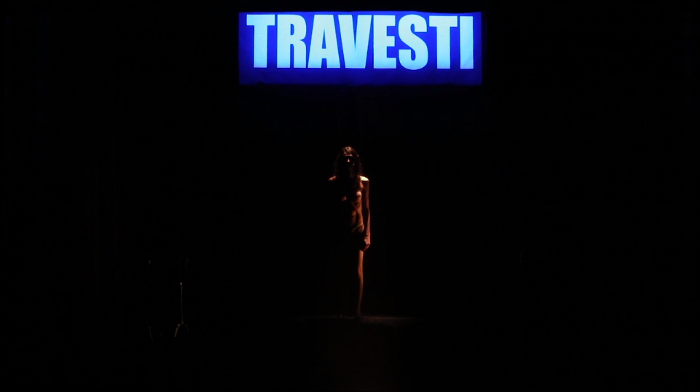
Meanwhile, Campinas was celebrating its annual Feverestival – so I had another bellyful of great international theatre to digest. From Rio de Janeiro came the Black Brazilian company Coletivo Preto with Cia de Teatro Intimo. Their collaboration, Negra Palavra Solano Trindade, explored the experiences and self-identities of young Black males, using the words of renowned Brazilian poet Solano Trindade, combined with ensemble physical theatre, street dance, and live music. Feverestival also brought us the immersive and messy Inauguration Party by Teatro de Concreto, which investigates ‘the act of destroying, reconstructing and producing narratives as a constant cycle in the history of mankind’. We are invited to crunch through pieces of broken statues; watch the actors voice found texts, manipulate toy dinosaurs, and simulate sex with tables; then contribute to the destruction of the (plaster) set with hammers. The notion of lost worlds, destroyed civilisations, archeological layers exposed, and the never-ending cycle of creation and destruction in the world felt both of the moment and timeless.
Then, there was the wonderful Renata Carvalho with her solo autobiographical piece Manifesto, exploring her journey as a trans woman. I’d previously seen her give a wonderful performance in the Brazilian version of Jo Clifford’s The Gospel According to Jesus, Queen of Heaven.
A great festival programme – but the best was last: from Mexico came the brilliant Vaca 35 Teatro, with Josefina La Gallina Puso Un Huevo en la Cocina, featuring one of that country’s greatest physical theatre performers, Jose Rafael Flores, who played all characters (yes, including the eponymous Josefina the hen), and created onstage sparks with musician Alberto Rosas, playing call-and-response with each other; the words, music and physical action creating a fabulous conflagration of theatrical brilliance.
Feverestival ends; Carnival begins. I stagger through exhausted. I’ve made a new show, and done a month of festival shows – of course I’m tired. But this tired? I spend the first couple of days in Barão Geraldo, enjoying the wonderful local samba ensembles Cuipinzeiro and Altaneira – all the usual exuberance of durational performance as the troupes process through the streets from 5pm till 2am (although I bow out by 11pm). The samba troupe – a small band, a large bateria of drummers/percussionists, and accompanying dancers – are of course the main focus, but there’s also the flag-twirlers, the stilt-walkers, and the animated objects and giant puppets. Outdoor arts at its best. Foolishly perhaps, given how tired I am, I fly over to Rio for a few days. Why so tired, I wonder again as I clamber up and down the steep streets of Santa Teresa for Mardi Gras, and for the following day’s Me Enterra na Quarta bloco – the name meaning translates as ‘bury me on Wednesday’ and is a reference to Ash Wednesday, the holy day after Mardi Gras when Carnival has supposedly ended and Lent begun. The diehards party on, and I’m there – hours of being propelled along in a sweaty crush of thousands of people, pulling out occasionally to take a break with a beer. Eventually I’m too tired to move, and I stagger home with friend Joelson to his Lapa house. I fall asleep, awake in a deep fever, and then sleep another 12 hours. I sleep some more, I sweat some more. I have extraordinary dreams. I’m eventually diagnosed with dengue fever – and only just get myself ‘signed off’ in time to travel back to the UK.
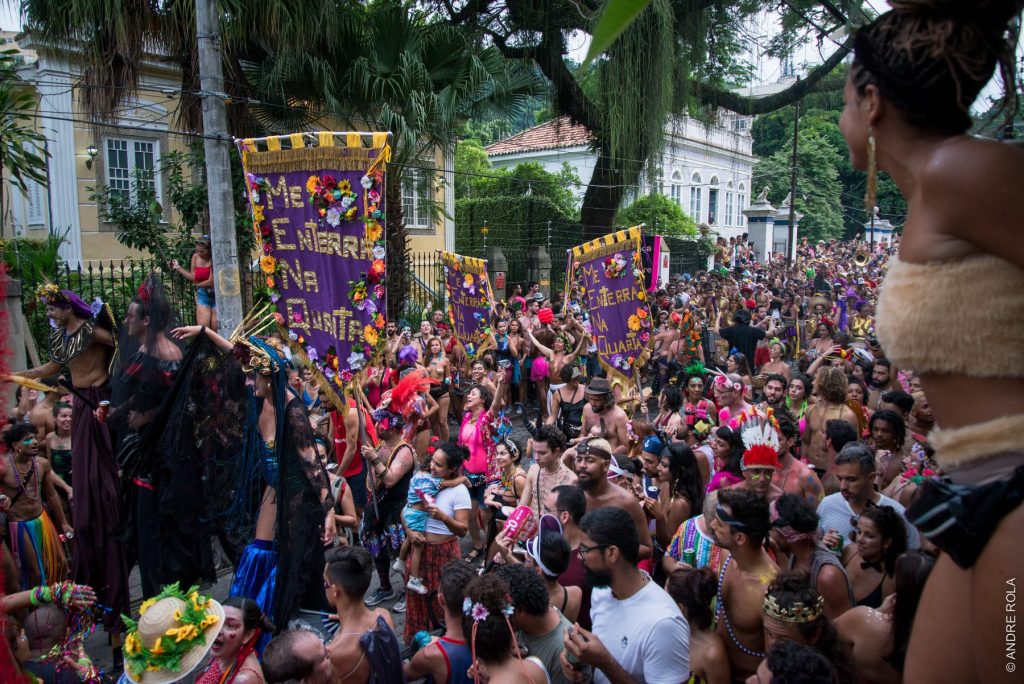
Arriving at Heathrow, still weak, with a cough (not a dengue symptom – so plane flu, then?) I’m greeted by a phone call from my eldest son. Go straight home, he says. (Of course – what else would I do after a 12-hour flight with a heavy suitcase in tow?) Go home, stay home. Why? There’s a pandemic on its way to the UK – haven’t I seen the news from Italy? Well no, actually. You need to go home and self-isolate, he says. We’re about a month behind Italy, following the same pattern. You’re old (!), you’ve been ill (true), and you’re vulnerable. Really? I promise I’ll be good.
Of course, I wise up soon enough, jolted out of my ignorance by the barrage of information and mis-information in newspapers, on the radio, online. My friends from ParaladosanjoS – whose circus-theatre show Nini’s Hair I’m going to bring to Brighton Spiegeltent in May – message to say that Virgin Atlantic have cancelled their new flight route to Heathrow, and that their London friends have said there’s a lot of panic about rising cases of this Covid-19 illness. Not here in Brighton, I reply. Safe as houses, no panic. But it is odd – all my company’s bookings (I produce and direct outdoor arts shows and interactive dance events) for the UK festival season have come to a halt I have April and May gigs in the calendar but nothing for June onwards. Hmmm…. Will the Brighton Fringe go ahead, ask my Brazilian colleagues. Of course, I say – book another flight.
Things change daily in March – it’s hard to know what’s going on, and what it all means. A week after arriving back in Blighty, on 12 March, England moves from the ‘contain’ phase to embrace a new ‘delay’ policy. Nothing to see here, it’s all going to be fine, is the vibe. We’ll sort it, and sort it soon, you’ll see. My musician husband is in Spain. There’s a lockdown here, he says, they are taking it all very seriously. Police patrolling the streets.
Oh, these unfamiliar words, that trip so awkwardly off the tongue – pandemic, lockdown, self-isolate.
A week or so later, everything has shifted again. Brighton Festival and Fringe have cancelled. Norfolk & Norwich Festival (also in May) take a bit longer to make the decision, but soon they’ve cancelled too. One by one, over the coming days and weeks, every major festival in the UK cancels or postpones – other than Greenwich + Docklands International Festival, one of the beacons of the Outdoor Arts season, who are determined to go ahead, moving all activity from late June to August. Oh and the Edinburgh Fringe, which despite the Edinburgh International Festival cancelling are holding on to the idea that they might be able to make some sort of Fringe programme happen – August is a long way off, after all. The flamenco-playing husband is ferried home on an Easy Jet emergency flight from Granada to Gatwick.
By Friday 20 March, we’ve entered lockdown. Theatres go dark. Galleries, concert halls, pubs and clubs close. People can’t gather anywhere, not even outdoors. Like everybody else I know, I lose all performance work: all my confirmed and pencil bookings are wiped off the calendar, not just for the summer festival season, but even the indoor bookings for autumn and winter. We just don’t know, say the bookers. We’ll get back in touch when we do.
Now what? We sit and wait it out. It’ll be around 12 weeks, say our government. Sorted.
Once I’m over the shock of all the performance work cancellations – and the tedium of all the funding applications for ACE emergency support, and for the minuscule crumbs in the form of commissions that everyone else is also applying for – I settle down to the ‘new normal’ as it gets called. Luckily, I’m a writer. I write. I read. I read. I write. There’s this thing called Zoom. I set up classes to teach on Zoom. Writing not dancing. No way am I dancing on Zoom.
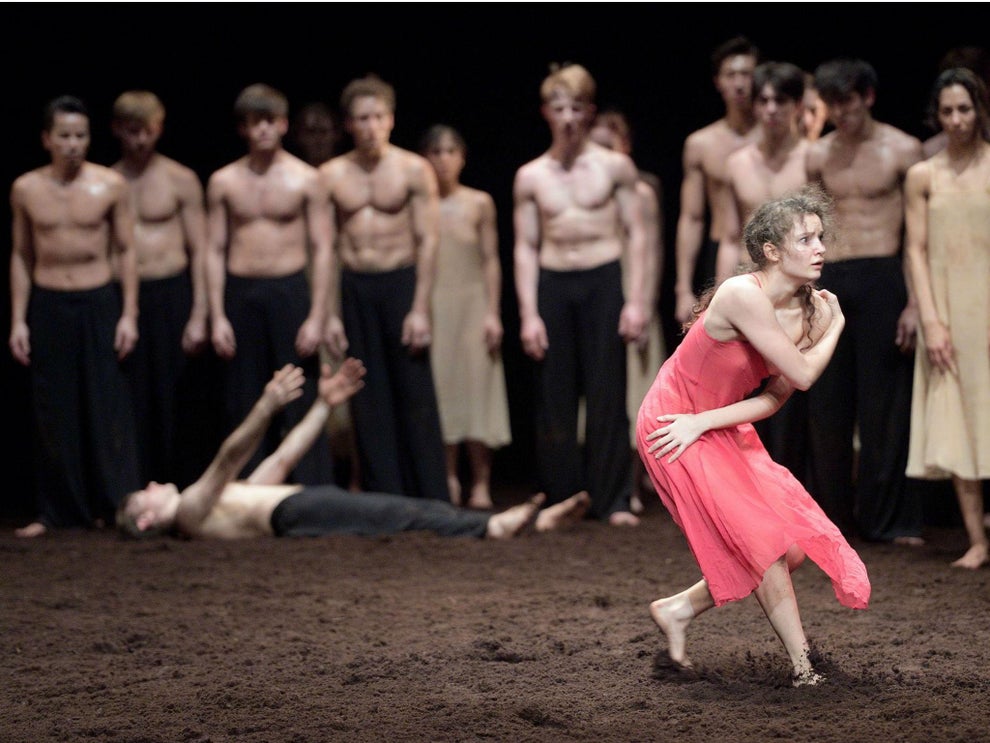
Now it’s early April. Case numbers and deaths hit a horrible peak over the Easter weekend. The Edinburgh Fringe has finally conceded that it can’t go ahead. All the major theatres are now falling over themselves to offer us online content. The National Theatre gives us a season of big hits. I watch One Man, Two Guvnors. A film of a theatre show. Documentation, not art. Performed by people who are acting to a live audience, not acting to camera. It just doesn’t work – not for me, anyway. It’s a facsimile of theatre. And it’s not film – there’s no cinematographic skills involved here. I watch some of Sadler’s Wells Pina Bausch films – Palermo Palermo, and Rite of Spring. These are better – good documentation of a live event, at least.
But it’s not what I need right now. If I can’t have real live theatre, I’ll opt for theatre of the mind – novels – and for actual film rather than filmed theatre. Film, a medium in which people who are trained to perform to camera do so, within a scenographic context forged by someone who knows how to create a mis-en-scene on film. Oh, and the live web cam from the Wolf Conservation Center in upstate New York. That too.
I walk, I garden, I try to bake cakes and fail. I read, I write, I teach. I listen to Radio 3. I do yoga and Pilates and Feldenkrais on Zoom. I watch the wolves. I walk to the woods. The birds are nesting, here and in my garden, and in the local parks – singing louder than they have ever done, or so it seems. The skies are the bluest of blue, with no vapour trails to tear the blue veil apart. The moon waxes and wanes. Life goes on. April becomes May. Our local coffee shop re-opens – for take-aways only, but still. Oh, the joy of a take-away cappuccino, drunk in the local park to the sound of birdsong. It feels like such a luxury, so exciting, so dramatic a shift. The theatre of life goes on.
May becomes June. The elderflower tree in the garden out-performs itself, overflowing with blooms – I’ve never made elderflower cordial before, but I find out it is easy, and now there is cordial for any one who can be bothered to walk up to our house to collect it. We get eggs delivered to the door from a local farm. We continue to get our fruit and veg delivered. We cook every day, three times a day. I walk down to the seafront once a week. The sea is its own wonderful self, always. Constant, and constantly changing. It ebbs and flows. Waves roll or crash onto the shore. It’s a theatre show that doesn’t care a jot about whether humans are there to witness it or not. The seagulls ignore me. They’ve given up on instant fast food, and have learnt to fish for their supper, rather than wait for it to appear in a rubbish bin, wrapped in paper. They are now roosting in their scores under Brighton Pier, and as I watch them diving down into the waves, I muse on the fact that some of those young birds have forgotten what chips are, if they ever knew. The tide comes in, the tide goes out.
Who needs theatre when you have all this?
Actual theatre – making it, watching it – seems like a distant memory. My Total Theatre inbox is chock-a-block with invitations to online theatre performances. I ignore them all. I’m enjoying the peace and quiet, and the email cacophony irritates me.
I bide my time.
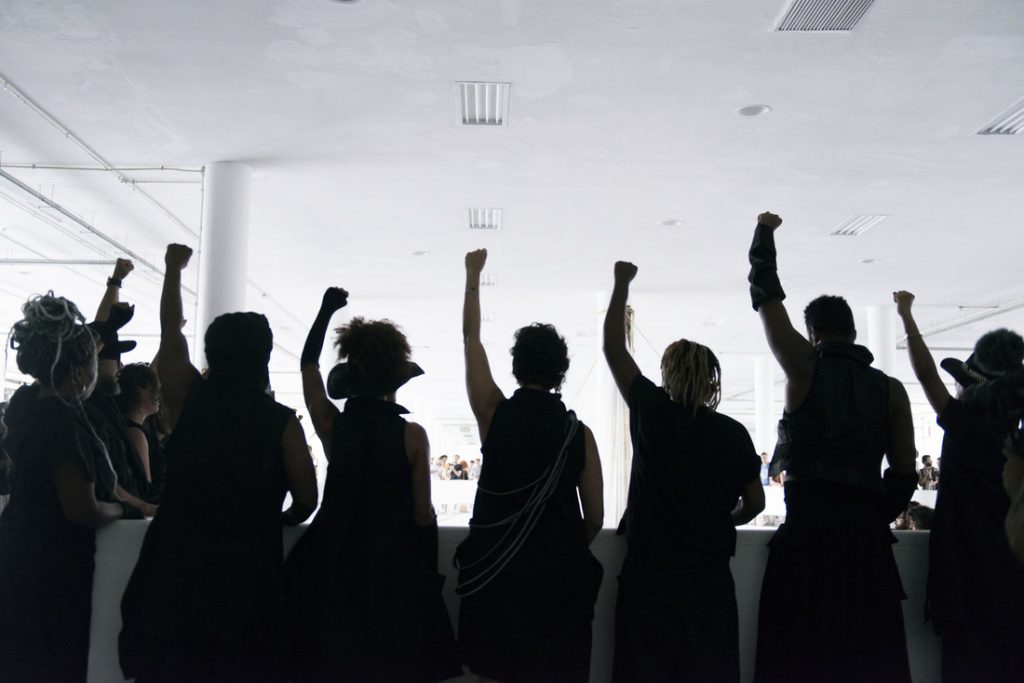
Images, top to bottom:
Featured image: Neo Muyanga: A Maze in Grace, part of Faz escuro, mas eu canto/ Though it’s Dark, Still I Sing for São Paulo’s 34th biennale.
1927: Roots at TOM, Brighton & Hove.
Renata Carvalho: Manifesto at Fevrestival, Campinas, São Paulo state.
Me Enterra Na Quarta bloco, Rio de Janeiro Carnival.
Pina Bausch: Rite of Spring, filmed performance at Sadler’s Wells.
Neo Muyanga: A Maze in Grace, part of Faz escuro, mas eu canto/ Though it’s Dark, Still I Sing for São Paulo’s 34th biennale.

